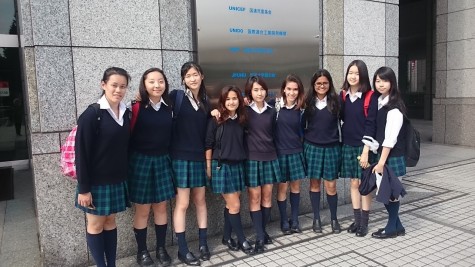AP Economics classes attend lectures at the UN University
On October 15, Ms. Saso, along with nine students from her AP economics classes, visited the UN University to listen to commemorative lectures by Blue Planet Prize winners, Professor Sir Partha Dasgupta and Professor Jeffrey D. Sachs. Sacred Heart was invited by Ms. Yuzawa, a middle school parent, who is associated with the Asahi Glass Foundation, who presents the award. Other than Sacred Heart, the lecture was attended by students from the UN University and Keio University.
Every year the Blue Planet Prize, established in 1992 by The Asahi Glass Foundation, has been awarded to individuals or organisations that make major contributions to solving environmental problems on a global scale.
Professor Sir Partha Dasgupta is a Professor Emeritus of Economics at the University of Cambridge. Professor Dasgupta presented a lecture on“Sustainable Development and the Wealth of Nations.” In the lecture, he repeatedly stated that the progress of the economy should not be judged by gross domestic product, which only measures the flow of output during one year in the economy, but instead, by the nation’s stock of wealth or assets, which reflect the state of the environment. Sir Partha Dasgupta concluded with a proposal, “as nations begin to meet the SDGs (Sustainable Development Goal), their Statistical Offices should begin to prepare wealth accounts and track movements in wealth through time. Just as firms create annual balance sheets, governments should prepare annual wealth accounts.”
Professor Jeffrey D. Sachs is the Director of the Earth Institute at Columbia University. He is well known as the Special Advisor of the UN Secretary General on the Millennium Development Goals for both Kofi Annan, seventh Secretary-General of the United Nations, and Ban Ki-moon, current Secretary-General of the United Nations. The lecture followed Professor Dasgupta’s argument of utilising the nation’s current wealth to determine the progress of the economy. The lecture focused on meeting the challenge of the Sustainable Development Goals.
The lectures taught the Sacred Heart Economics classes the importance of economics in the present world. Anju (11) from AP Microeconomics class said, “through both Professor Dasgupta and Professor Sachs I was able to get a thorough idea of economy evaluation as well as the challenging goals we have to face. Professor Sachs mentioned the issue of poverty in some areas of the world. These people need assistance for development but the developed countries do not help them. Instead, they spend a lot of money on weapons, leading to war. In order to have a good quality of life, countries need to help each other for a fairer society.”
Linda (11), asked during the 70-minute panel discussion, “Can you expand on your statement that marginal utility of an extra dollar for the rich could be negative?” However, due to time constraints, her question was left unanswered. The next day, Ms. Saso was forwarded an email from Professor Sachs with the following answer to Linda’s question:
“The fact that an extra dollar (or Yen) of income raises happiness less for a rich person than for a poor person is well established in many studies. This fact is known as the “diminishing marginal utility of income.” My observation was that for exceedingly rich people, the marginal utility of income may be negative. There is no “iron law” of this sort, and I am speaking impressionistically, not as the result of research that I know about. My observation is that for very rich people, the “extra dollar” is not usable for consumption per se, since there is no way for a single human being or household to consume billions of dollars.
What then does the extra money bring? It may bring more power, perhaps. It generally brings attention and notoriety. It brings many courtiers and people seeking assistance. It generally leads to a loss of privacy. It may lead to a competitive situation where the super-rich individual is expected to climb further up the rankings of the super rich. We do know that many super-rich people end up as alcoholics, drug addicts, divorced, scandal-ridden, isolated, eccentric, or socially burdened in some other way.
All of this is why I said that imploring the super-rich to use their money philanthropically, and imploring society to tax the super-rich adequately, are both correct and socially useful approaches in my view. Some super-rich have become outstanding philanthropists (such as Andrew Carnegie, John D. Rockefeller, and Bill Gates).”
At the end of the conference, Professor Sir Partha Dasgupta concluded with an impactful message, “Take a chance in the word that is interconnected and have an open outlook. Although morality is an important factor to think about, students must have more curiosity.”

Economics class students who attended the lecture.






































